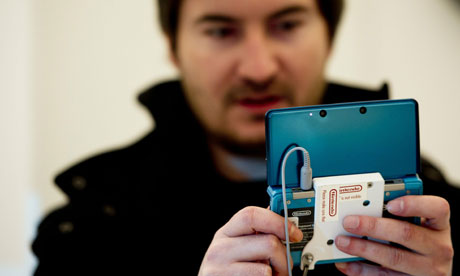 |
| Photo Credits: The Guardian |
The most well-known impacts of the gaming industry's increase in popularity are those with negative connotations, particularly to do with social isolation and violence. To address the former, I would like to say that many people do in fact talk to people online. Stop. Isn't that a bit dangerous I hear you say? Talking to people you don't know ('los desconocidos' in Spanish)? Yes, it's true that some people take advantage of the system, but that is only a small minority that make the headlines. For the most part the typical person online is aged 13-17 and just wants to innocently have a chat about the game they're playing. Obviously you can never be too cautious, but there are so many young people socialising online with many ways to report someone that this should not be such a worry any more. On the other hand, I do get some adults' point that these young gamers are less confident at making conversation in the real word, because in many cases it's true. In the gamers' defence the games do create a good topic of conversation that can last for hours on end. Furthermore, 79% of parents from the US place limits on gaming time their children have, which I believe is good to stop complete social isolation. There are strategies out there, you just have to find them.
The amount of violence in many games has become a worry for many parents, as they believe their children should not be exposed to this until they are mature enough. Hint: that is what age ratings are for. It's the parents decision if they buy their children Call of Duty when they're only 13. And if you think that doesn't happen, it does, as only today did I hear on the bus that a 13 year-old had been given Call of Duty Ghosts and Battlefield 4 for Christmas. I was shocked, but thought that if his parents thought he could handle it, then who am I to judge? Also, the violence in the game allows young people to be taught about what to do and not to do and to see what happens when something goes wrong.
This (intentionally) leads nicely onto my next point: brain training. Many games have actually been proved to strengthen your brain in some way, or relax you after a hard day's work. For example, sandbox games, such as the super popular indie title Minecraft, allow you to explore a world with different mechanics to our own and discover new ways to do whatever you want. Seriously, Minecraft is amazing for any person, and I apologise for introducing it to you as you will now have no free time left for anything else.The capabilities are endless in these sorts of games, and I'm glad to see more appearing on the market, such as Terraria.
Para concluir (To conclude), there are negative impacts to video gaming, such as being unsociable and violent, but these only occur if a person games in excess. In my opinion, the benefits of gaming such as the brain training and immense enjoyment one gets out of it outweigh the disadvantages.

No comments:
Post a Comment